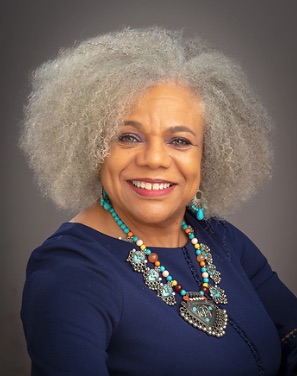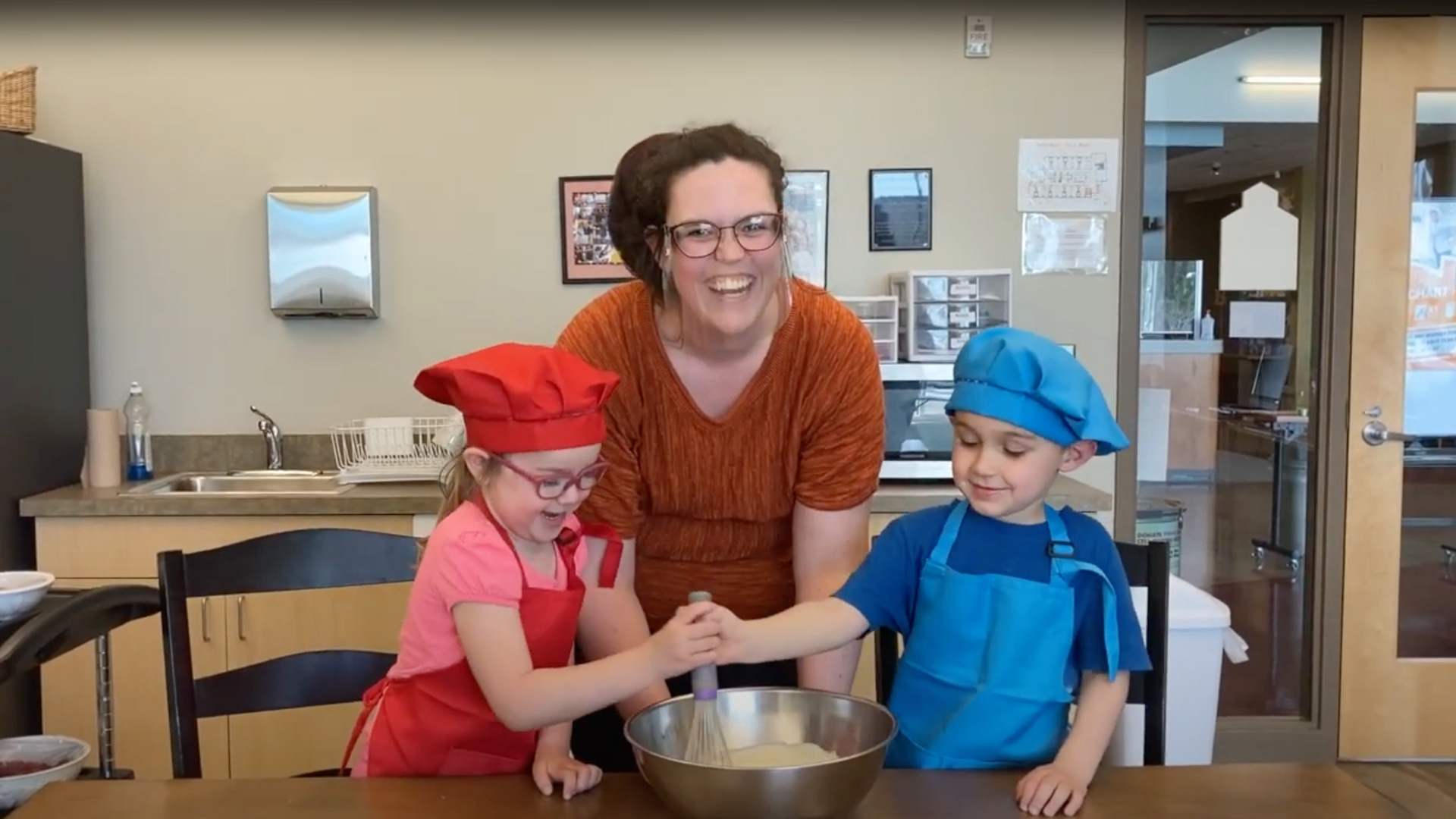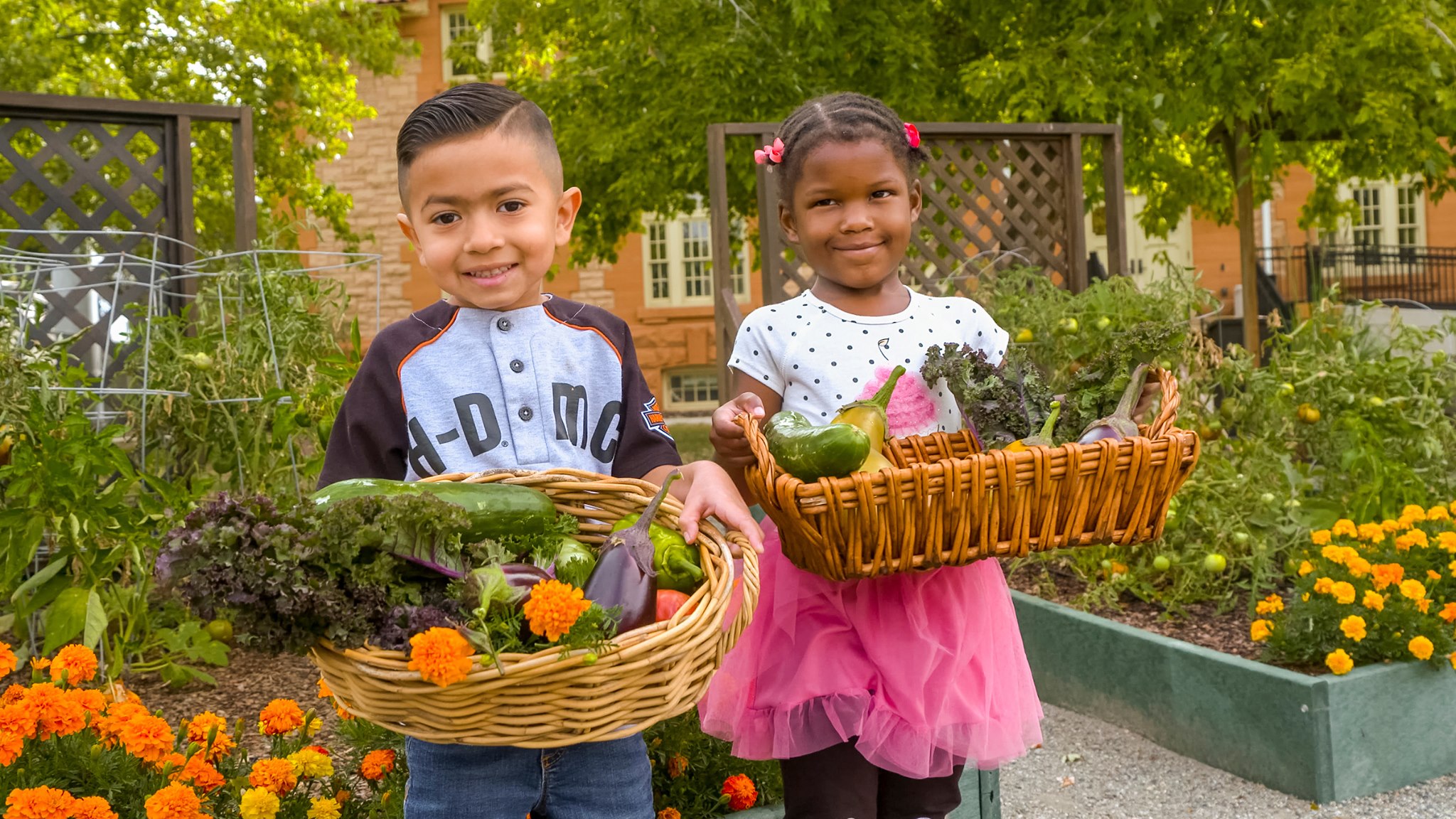When you’re not sure what to eat,
But you want to make a healthy treat,
A delicious meal so tasty looking,
Join us—we’re Edu-Cooking!
With that jaunty jingle sung by a chorus of children’s voices, Assistant Cook Jasmine Bumps kicks off her hands-on video cooking lessons for Educare Central Maine’s families and children. Today’s episode of Edu-Cooking costars two preschool chefs in colorful aprons and matching toques who dutifully plop fruit into frozen yogurt batter and taste fresh-from-the-microwave applesauce they’ve just helped Bumps make.
“Honey is from bees!” exclaims one of the little chefs, who then proceeds to tell Bumps everything he knows about bees as she tries good-naturedly to stir in the honey and keep the show rolling with the recipe.
The preschooler’s oversharing of bee knowledge is both adorable and is the point of the Edu-Cooking videos and the various programs of the Educare Learning Network—which includes the Central Maine school—that raise children and families’ awareness of nutrition.

“One of the architectural features of all our schools is that they have kitchens—and many of them have cooks on site,” says Cynthia Jackson, the Educare Learning Network’s executive director and senior vice president at national nonprofit Start Early. “Some of the schools have meals prepared offsite but having an industrial-sized kitchen in each of our Educare schools allows staff to cook some meals and offer cooking classes for the kids and their parents.
“We start with good food—healthy meals and snacks,” Jackson says, “but we also want to build an understanding of nutritious food—where it comes from, how to grow it, and how to prepare it.” Jackson cites a new study from Healthy Eating Research that found when schools fully align their school meal nutrition standards with the Dietary Guidelines for Americans, they see improvement in students’ health, well-being and overall academic performance.
The national Educare Learning Network provides high-quality early education via 25 independent birth to 5 schools in under-resourced communities across the U.S. Educare schools can be found in urban, suburban, rural and tribal communities across 15 states, the District of Columbia, and the Winnebago Tribe of Nebraska Reservation.
A unifying theme in all the schools is the emphasis on healthy eating—though individual schools tailor their approach to that theme according to what works for their community. For some, Jackson says, that means a school garden; for others, it may mean a container garden in the school with pots full of plants placed wherever the sun is best. Some schools grow their veggies at community gardens adjacent to the schools and others have partnerships with organizations in their communities that provide them with nutritional produce.
Educare New Orleans initiated a three-year pilot nutrition-education program In August 2022 using the pre-K We Inspire Smart Eating (WISE) curriculum. Developed by the University of Arkansas with the U.S. Department of Agriculture, the WISE curriculum provides teachers with the tools and training to promote healthy eating behaviors in pre-K kids. In collaboration with Louisiana Technical University, Educare New Orleans uses the WISE curriculum to increase the number and variety of fruit and vegetable servings children eat. It engages families via social media as well as family meetings with small cooking sessions to help families learn to do more with fruits and vegetables. Kids who might have said they hated fruits and veggies learn to make and ask their parents for a variety of foods—even kale chips.
In addition to its Edu-Cooking videos, Educare Central Maine, with nearly a third of its families reporting food insecurity, runs a food pantry set up as a market where families can go shopping for food items. The Edu-Cooking lessons play off what’s available from the pantry, such as “What do I do with all this extra bread?” Jasmine’s answer? “Here’s how to make croutons and breadcrumbs! Nothing goes to waste!”
Edu-Cooking and the Educare Market both stemmed from the pandemic and the school’s efforts to provide food and necessary supports to its families. According to Erica Palmer, Educare Central Maine’s education manager, when the pandemic began, many families passed on the food offered because they wanted to make sure it went to “those who are truly in need,” even though they were struggling.

“So, we shifted and began to market the resources we had in a different way,” Palmer says. “We put the Educare Market out front and available to all, so our kids would encourage their caregivers to stop by every day and bring things home.
“Our Edu-Cooking videos were a fun way to encourage families to use the food we supplied in our market in new and creative ways.”
A dozen Educare schools have gardening programs that introduces the natural world to children and helps them answer the question, “Where does this come from?” Jackson says most of the gardening programs are developed to include foods that fit within the cultural context of the communities they serve.
“They’re growing things that are familiar to the parents in their own communities, as well as things they have maybe never tried before,” she says. “The parents are involved in cooking and nutrition classes, then can take fruit and vegetables from the school garden and cook them at home. They’ve really taken to it—and at some of our schools, our parents are the lead gardeners and they take great pride in that.
“The value of the gardens is that you’re teaching self-directed play and the value of sharing when they’re in the garden. The kids plant seeds and tend the plants and then harvest the food they’ve grown. It is such an exciting process for them.”
Educare’s Ongoing Learning and Sharing
All Educare schools are designed to be demonstration sites that not only deliver high-quality early learning, but also constantly assess and evaluate what works for the children, parents and staff.
“We’re always looking to get better,” Jackson says. “We use data to tell us which child needs intervention or additional individualization to improve their social emotional or cognitive development. We also want to know what parents might need to live their hopes and dreams. Do they want to go back to school? Get a better job? Better housing? We want to help them find the resources to do that.”
Each of the schools is created through a public-private partnership, funded with public dollars such as Head Start, Early Head Start or education dollars from local school districts. The philanthropic partners, starting with an anchor funder, may have ties to the community or to the region. The core foundation of every Educare school is a collaboration—between funders, program providers, school districts, parents and other local community partners—not only to develop and launch the school, but to sustain it over the long run.
“Communities call us and want to be a part of this network,” Jackson says. “Our intention isn’t necessarily to have an Educare school on every corner. Our goal is for our schools to be learning labs where we share what we’re learning with others to improve early childhood in all the organizations that are serving children of this age. Ultimately, the bottom line with the Educare Learning Network is that we want to see the funding streams in America changed so that every child from birth to kindergarten can have high-quality early learning.”
Ensuring that all children have access to nutritious food is a fundamental part of that mission, Jackson says.
“It should be at the top of everyone’s list,” she says. “Poverty in America is hidden from those who don’t want to see it. So, if you’re not in an under-resourced community that doesn’t even have a grocery store, if you’ve always had access to plenty of good food, you’d look at this emphasis on providing nutrition and say, ‘What’s going on here? What are we talking about? All families in America have breakfast, lunch and dinner, don’t they?’
“Well, no they don’t. So, part of what we will do is continue to weigh in, to write letters to our legislators about the importance of funding food security and nutrition in the early childhood education space.”
And in the meantime, Educare will continue to start at the very beginning: good food and nutrition education from the get-go.

K.C. Compton
K.C. Compton worked as a reporter, editor and columnist for newspapers throughout the Rocky Mountain region for 20 years before moving to the Kansas City area as an editor for Mother Earth News. She has been in Seattle since 2016, enjoying life as a freelance and contract writer and editor.



